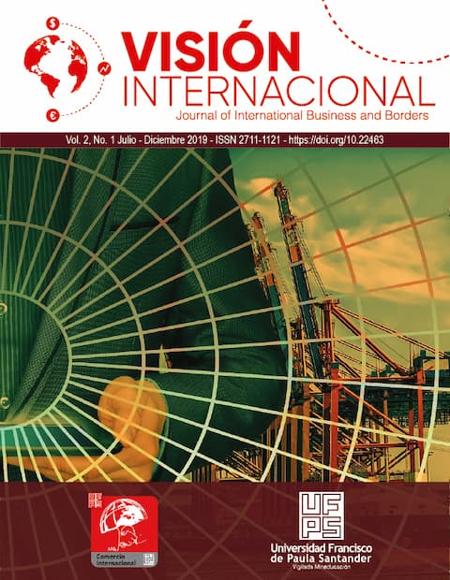Analysis of the commercial problem caused by the separation of the Korean peninsula
Análisis de la problemática comercial que deja la separación de la península coreana
Main Article Content
This article aims to know and understand the origin of the problem of the Korean peninsula, also showing the social and commercial factors that have left the division of this nation, on the other hand shows the effects that have been had at the level of education and with the deserters of these nations; knowing the international relations showing also the intervention that the powers in the conflict have had, the foreign investment; Finally, it shows the achievements that have been obtained in the reunification of Korea, leaving aside nuclearization.
Article Details
Álvarez, M. (2018). Las dos Coreas: un cruel legado de la Guerra Fría. Revista Nueva Sociedad
Astor Molero, P. (2015). Comprender la península coreana: una historia de unión y división. Análisis histórico-comparativo de Corea del Norte y Corea del Sur.
Chiñas, C. G. (2003). Comercio exterior y desarrollo económico, el caso de Corea del Sur. Análisis económico, 18(37), 141-155.
Giné, J. (2008). Corea, una nación dividida en dos Estados. Política Exterior, 139-152.
Hille, E., Shahbaz, M., & Moosa, I. (2019). The impact of FDI on regional air pollution in the Republic of Korea: ¿A way ahead to achieve the green growth strategy? Energy Economics, 81, 308-326. DOI: https://doi.org/10.1016/j.eneco.2019.04.004
Hyun, MK (2019). Determinantes del uso concurrente de biomedicina y medicina coreana: un estudio basado en la encuesta del Panel de Salud de Corea (2008-2014). European Journal of Integrative Medicine, 25, 1–5. Doi: 10.1016 / j. eujim.2018.11.005
Insua, M. C. (2016). Una guerra inolvidable: el conflicto de Corea y su cobertura mediática. http://cud.unizar.es/docum/17-% 20comunicacion% 20revisada.pdf.
Jiménez, J. J. L. (2004). Corea del Norte: ¿hacia la apertura y la reunificación con Corea del Sur? México y la Cuenca del Pacífico, (22), 40-45. DOI: https://doi.org/10.32870/mycp.v7i22.227
Kim, S. S., & Prideaux, B. (2006). An investigation of the relationship between South Korean domestic public opinión, tourism development in North Korea and a role for tourism in promoting peace on the Korean península. Tourism Management, 27(1), 124-137. DOI: https://doi.org/10.1016/j.tourman.2004.08.001
Lee, M. W., & Ahn, S. H. G. (2016). Relocation in space, language, and identity: Dislocated North Korean undergraduates in South Korean universities. Language & Communication, 47, 43-52. DOI: https://doi.org/10.1016/j.langcom.2015.11.005
Licona Michel, Á., Barajas, C., & Ayesa, C. (2013). Panorama de las relaciones ínter-coreanas en la era de Kim Jong-un. México y la Cuenca del Pacífico, 2(3), 75-101. DOI: https://doi.org/10.32870/mycp.v2i3.398
Liesa, F., Carlos, R., & Borque Lafuente, E. (2013). El conflicto de Corea.
Min, W. (2004). El rol de la educación para la unificación de Corea. Comunicación escrita en Chile de cara al mundo asiático: Cultura y Negocios en APEC. Seminario de la Pontificia Universidad Católica de Chile. Santiago de Chile. Consulta on-line en: http://www7.uc. cl/ceauc/papers/Min_04.pdf.
Mora, J. P. (1998). La situación en la Península de Corea. Boletín de Información, (257), 3.
Park, S., Lee, M., Park, S. J., & Lee, M. G. (2018). Health risk behaviors and psychological problems among South Korean, North Korean, and other multicultural family adolescents (2011–2016). Psychiatry research, 268, 373-380. DOI: https://doi.org/10.1016/j.psychres.2018.07.042
Shin, H., & Stevens, Q. (2013). How Culture and Economy Meet in S outh Korea: The Politics of Cultural Economy in Culture‐led Urban Regeneration. International journal of urban and regional research, 37(5), 1707-1723. DOI: https://doi.org/10.1111/j.1468-2427.2012.01161.x
Training Society for Intercultural Education, & Research. International journal of intercultural relations: official publication of SIETAR: the Society for Intercultural Education, Training and Research. Elsevier Science Pergamon.
Yang, E. (2012). Corea del Norte en la encrucijada. Revista UNISCI, (30), 143-150.
Yu, W. I. (2004). Spatial Inertia of a Divided Nation: Korea, the Last Remnant of the Cold War. Petermanns geographische Mitteilungen, 148(5), 6-15.






